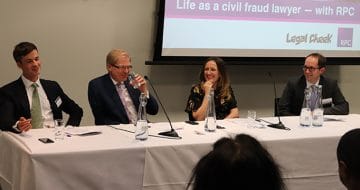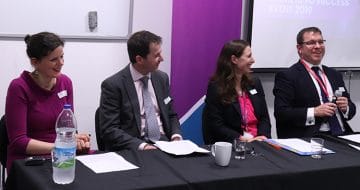RPC associate David Healey speaks to Legal Cheek Careers about his work in the firm’s Professional and Financial Risks team and his experience on secondment

“There are often high stakes involved for the individuals in many of the risks we advise on,” says David Healey, associate in RPC’s Professional and Financial Risks team. “We regularly advise commercial insurers in relation to high profile investigations or claims against directors of global companies. The directors’ livelihoods and liberty can be at stake, which helps me really appreciate the gravity of the work.”
David’s team is part of RPC’s broader insurance practice, and is split into two groups. The professional risks group specialises in defending claims against professionals like solicitors or accountants. Think of a client suing a solicitor for negligent advice. “In these situations, the law firm will have what is known as ‘professional indemnity insurance’ which provides cover to protect them against negligence claims,” David explains, continuing that the team “is often instructed by the insurer to act on behalf of the insured firm in defence of the claim.”
The other group, which is where David specialises, deals with financial risks. They specialise in providing coverage advice to insurers in relation to certain types of commercial insurance, such as Directors & Officers (D&O) or Financial Institutions (FI) insurance, and in defending those insured (including directors).
“Corporate directors are exposed to all sorts of risks in their role,” says David. These can range from “class actions brought by a group of shareholders alleging a drop in share price as a result of a director’s poor decision-making, to investigations brought by regulatory bodies like the FCA or SFO for things like fraud or misconduct.” David notes there is often an international element to the work, with the team having been involved in risks emanating from across the globe, including the US, South America and Asia-Pacific.
A mix of advisory and contentious work
Consider an example of a director at a publicly-listed company who is being investigated by the Serious Fraud Office for alleged fraud. In such situations, the director would typically have the benefit of a D&O insurance policy, which the company will have purchased from an insurer (RPC’s client).
Once the claim is brought against the director, they will seek to rely on the insurer to cover their legal costs, among other things. This is typically where David’s team would get involved on behalf of the insurer. The team will review the insurance policy wording to check whether the insurers would be liable for any costs under the contract. “We analyse the underlying claim against the insured company or director, and then advise insurers on whether this falls within the wording of the policy. Our coverage advice is usually produced in the form of a report, which may be long or short depending on the complexity of the matter,” David explains.
If the lawyers advise that the claim is covered under the insurance policy, David’s team will often provide monitoring advice to the insurers over the duration of the claim, including attending meetings with the insured company/director and their own defence lawyers. “Since our clients are paying defence costs which often run into the millions, we want to be on top of the strategy and understand how the matter is progressing. Our clients will also have a final sign-off on any settlements that the insured director may enter into with the claiming parties if the settlement is covered under the policy.”
If the team decides that the director’s claim is not covered, things might get trickier. David explains this with an example: “If we advise that the claim is not covered under the policy while the company claims otherwise, a dispute can arise which might result in court/arbitration proceedings against our insurer client in which we will then act in a defence capacity. These types of disputes can go all the way to trial, but are more often dealt with via mediation or arbitration.”
Staying on top of commercial trends
Working in the insurance risks sector means one has to constantly be up-to-date with any emerging risks that might impact clients. ESG (or Environmental, Social and Corporate Governance) is one such area that David predicts will keep his practice busy in the coming years.
“We try to stay on top of news about the types of things companies and directors are being criticised for in the press, as claims will often follow,” he says. “ESG-related examples include increased criticism of companies accused of ‘greenwashing’, as well as increased scrutiny of boardroom behaviour following several high-profile allegations of sexual misconduct. These issues are only going to increase risk for companies and their insurers.”
David’s advice for building commercial awareness is to stay abreast of market developments. “It’s important to have an understanding of the interplay between the economy and litigation trends,” he says. “As an example, in the years since the lockdowns we have seen high levels of inflation, huge rises in energy costs and increases in interest rates, all of which have made it more difficult for businesses to operate. As a result, company insolvencies have increased to levels not seen since the 2008 financial crisis. We are expecting insolvency-related claims against directors to increase off the back of this, for things like Wrongful Trading. So having a ‘horizon scanning’ attitude toward the economy and its impact on claims trends is really beneficial.”
Importance of secondments
David has previously had the opportunity to complete a 10-month secondment in the London office of global insurance giant, Zurich.
“It was a great experience to see things from a client’s perspective and learn more about how they operate as a business,” David tells me. “Also, a company like Zurich has a panel of different law firms they instruct, and I was able to really appreciate the preferences they have around the way their lawyers advise them.”
The secondment experience also helped him develop good relationships with other lawyers and clients working in the area. “It was a brilliant networking opportunity if nothing else, and I feel that I’ve made some really strong relationships with people in the team which will hopefully last for years to come,” he says.
Application advice
David also shared his top tips for training contract applications to a firm like RPC, which has a long-established insurance practice alongside its corporate and commercial practice areas.
David’s advice is to “think about what practice area you’re really interested in, then research the firms which are well regarded in that sector. If you can demonstrate a genuine interest in an area the firm specialises in, it can really help you stand out.”
Hear from lawyers at RPC at ‘Financial and professional risk’, a virtual student event taking place on 4 October 2023. Apply now.



